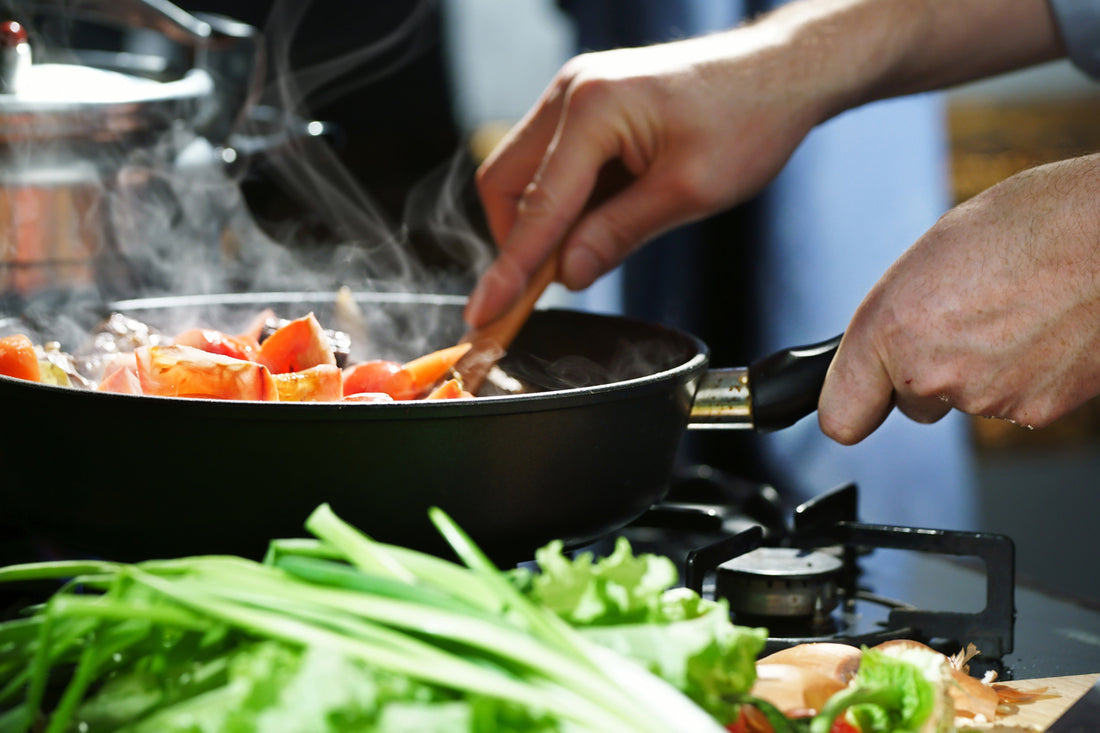
How Cooking Affects the Nutrients in our Food
Share
Cooking Styles and Nutrients
Chances are that you probably already know one way that cooking food affects your health, and not for the better. Deep frying food may be a favorite for taste, but it has been correlated with several health issues.2 This is believed to be due to the high level of trans fats in common frying oils, not to be confused with the healthy fats that you get from cold-water fish, avocados or certain nuts.
It’s important to note that cooking food isn’t always a net negative. In fact, in many cases, cooking food increases nutrient absorption by making certain foods easier to digest. One example is protein. Studies have shown that protein in cooked eggs is 180% more digestible than protein in raw eggs.3 However, most nutrients are decreased by cooking processes, including:
· Water-soluble vitamins, like vitamin C and the B vitamin family
· Minerals, such as potassium and magnesium
· Fat-soluble vitamins, like vitamins A, K, and E
Water-based cooking methods like boiling, poaching and simmering are some of the most popular methods, but for those water-soluble vitamins, it can be one of the easiest ways to lose potential benefits. For example, studies have shown that broccoli, spinach and lettuce can lose up to 50% of their vitamin C content when you boil them.4 This isn’t universal, though, as boiling fish has been proven to be one of the best ways to preserve its omega-3 fatty acid content.5 When it comes to cooking meats, it can be difficult to retain certain nutrients. Grilling and broiling have been shown to significantly reduce B-vitamin levels. The good news is that you have some options that give you better nutrient retention than others. Roasting and baking meats are a bit better when it comes to keeping nutrients, and a good way to help this is adding back meat juices where you can and avoiding overcooking them.
Overall, the best way to cook foods is steaming them, especially for vegetables. Remember what we said about broccoli, lettuce and spinach? Steaming them only reduces their vitamin C content by 9-15%.6 Other ways to help improve your veggies is to cook them in smaller amounts of water or to avoid peeling them whenever possible.
Reinforcing Your Nutrient Intake
As you can see, for the most part, the relationship between cooking and the nutrients in food isn’t as simple as one style being good and another being bad. Certain nutrients are more likely to be lost than others, though, and in the case of potassium and magnesium, these may be areas where people are commonly deficient.This doesn’t necessarily mean that you need to forever toss certain cooking styles out the window. However, if you plan on getting the majority of certain nutrients from your diet, even the most nutrient-packed foods may not be sufficient under certain circumstances. Depending on how you like your foods, it may make sense to reinforce your nutrient intake with dietary supplements, like Enzymedica’s Enzyme Nutrition Multi-Vitamin Two Daily. This blend of enzyme-activated nutrients helps support immune function and helps the body with energy production. It’s also a good idea to try supplements to help stabilize the digestive process, like Enzymedica’s Chewable Digest.
1. Scientific American, How Much Nutrition Do You Absorb From Food? https://www.scientificamerican.com/article/how-much-nutrition-do-you-absorb-from-food/, accessed 5/4/18
2. Gadiraju TV, Patel Y, Gaziano JM, Djoussé L. Fried Food Consumption and Cardiovascular Health: A Review of Current Evidence. Nutrients. 2015;7(10):8424-30.
3. Evenepoel P, Geypens B, Luypaerts A, Hiele M, Ghoos Y, Rutgeerts P. Digestibility of cooked and raw egg protein in humans as assessed by stable isotope techniques. J Nutr. 1998;128(10):1716-22.
4. Yuan GF, Sun B, Yuan J, Wang QM. Effects of different cooking methods on health-promoting compounds of broccoli. J Zhejiang Univ Sci B. 2009;10(8):580-8.
5. Stephen NM, Jeya shakila R, Jeyasekaran G, Sukumar D. Effect of different types of heat processing on chemical changes in tuna. J Food Sci Technol. 2010;47(2):174-81.
6. Chuli Zeng, (2013) "Effects of different cooking methods on the vitamin C content of selected vegetables", Nutrition & Food Science, Vol. 43 Issue: 5, pp.438-443,

